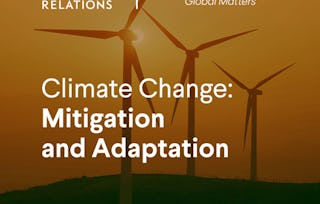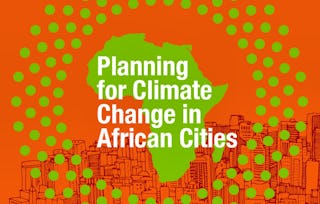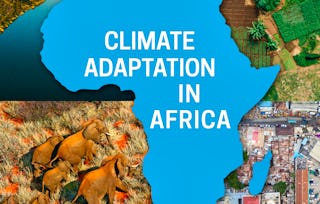This course addresses global climate change mitigation and adaptation, focusing on urban impacts and preserving Quality of Life (QoL). It is for urban planners, civil engineers, environmental scientists, and policymakers. You will learn about climate change effects on living comfort, industry, urban structures, land use, and transportation systems. We examine QoL definitions, climate risks in agriculture (fruit tree production), and urban heat environments. The course also covers impacts on infrastructure and transportation, and strategies for urban development. You will use climate change impact simulation tools to analyze urban heat and transport systems. To succeed, a basic understanding of environmental science or urban planning is helpful.

Adapting to the Effects of Climate Change on Quality of Life

Adapting to the Effects of Climate Change on Quality of Life



Instructors: Akito Murayama
Access provided by Coursera Learning Team
What you'll learn
Analyze climate change impacts on urban quality of life.
Assess climate change conditions and risks in Japan.
Develop strategies for climate change adaptation.
Evaluate adaptation measures for urban environments.
Details to know

Add to your LinkedIn profile
4 assignments
See how employees at top companies are mastering in-demand skills

There are 7 modules in this course
Welcome to the course! This module introduces you to 'Climate Change Adaptation: Quality of Life'. Please complete the pre-course survey to help us tailor your experience. We encourage you to use the Discussion Forum to connect with peers and share insights. We hope you enjoy the course!
What's included
5 videos2 readings1 discussion prompt1 plugin
This module examines global climate change and its specific conditions in Japan. You will analyze climate change impacts on quality of life, focusing on risk evaluation through a Japanese mandarin case study. Understand adaptation challenges by reviewing stakeholder interviews. This module builds foundational knowledge for applying adaptation strategies. To succeed, focus on understanding the regional context and risk assessment methods.
What's included
4 videos1 assignment
This module explores climate change adaptation in urban planning. You will learn urban planning basics and how EcoDistricts address climate issues. We examine practices in Nagoya City, focusing on climate impact simulation for community adaptation measures. This builds on your understanding of climate impacts by applying solutions to urban environments. To succeed, consider how these frameworks apply to your local context.
What's included
6 videos1 assignment
This module examines adaptive strategies within Society 5.0, focusing on technology for disaster resilience. You will learn how innovations like CASE and EVs develop resilience to environmental challenges, with a focus on vulnerable sectors such as ski resorts. We explore adaptive measures, from infrastructure to disaster preparedness, to navigate climate change and promote sustainable growth. This module applies previous adaptation concepts to technological solutions. Consider how these technologies can be implemented in various contexts.
What's included
5 videos1 assignment
This module explores fostering a sustainable society by shifting to a 'Stock-based Society' model. You will learn how prioritizing resource preservation and reuse can significantly mitigate CO2 emissions and reduce waste. We broaden the sustainability framework beyond energy and CO2 to include resource use. This builds on previous discussions of urban planning and adaptation by focusing on long-term societal durability. Consider how these principles apply to urban resource management.
What's included
3 videos1 assignment
What's included
1 reading
What's included
1 plugin
Instructors



Offered by
Why people choose Coursera for their career

Felipe M.

Jennifer J.

Larry W.

Chaitanya A.
Explore more from Social Sciences

Council on Foreign Relations

University of Colorado Boulder

United Cities and Local Governments of Africa

University of Cape Town


